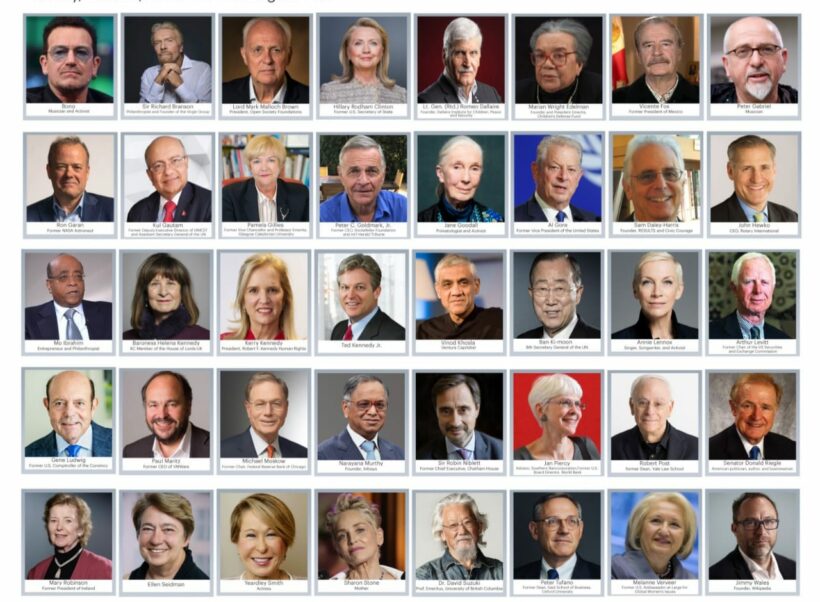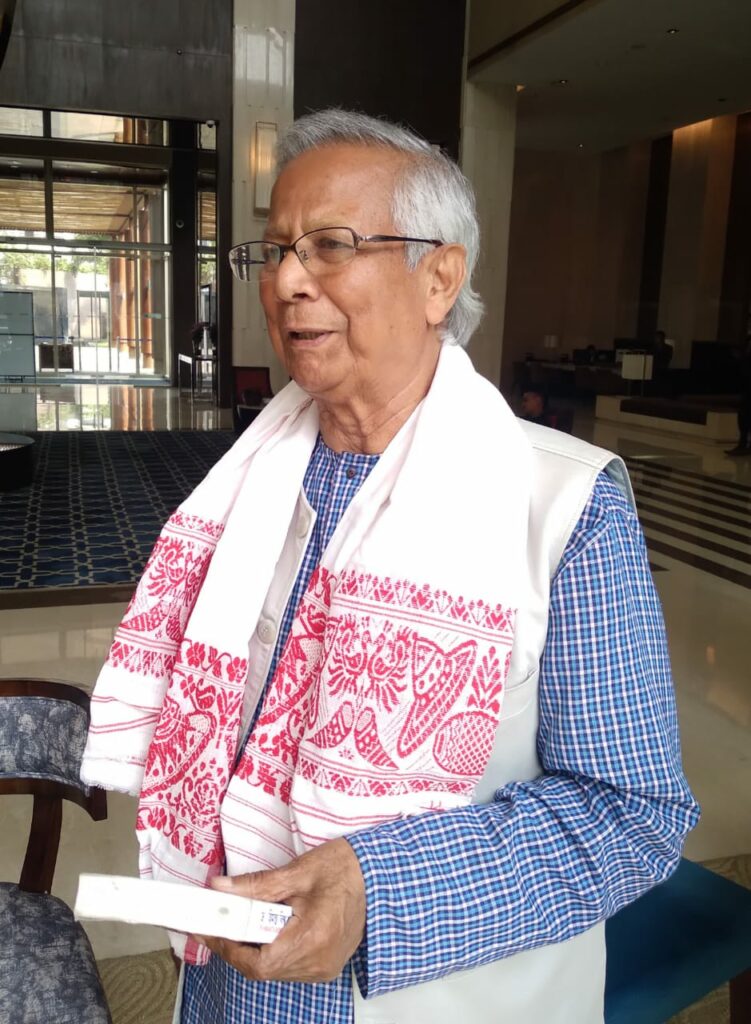Once a senior media columnist in Dhaka exclaimed that if one wants to witness how a lone Nobel laureate can be abused in his/her own country, come to Bangladesh. He referred to a brilliant University teacher of economics-turned revolutionary banker-turned social thinker Professor Muhammad Yunus, who was facing a series of verbal attacks from Bangladesh Prime Minister Sheikh Hasina Wajed. The daughter of Bangabandhu Sheikh Mujibur Rahman, who leads the ruling political party Awami League, has somehow developed uneasiness with the man with impeccable integrity, who created the world-famous Grameen Bank of Bangladesh in 1983.

The issue came alive as 40 global leaders from the fields of politics, diplomacy, business, arts, and academia recently sent a letter to Bangladesh Premier Hasina regarding her government’s treatment to
Nobel peace laureate Prof Yunus. The open letter, even published as a full-page advertisement in the Washington Post (7 March 2023), where it is claimed that Prof Yunus has never benefited financially from his involvement in any of Grameen avenues, rather he has devoted himself to the poverty-fighting missions of many organizations and lives modestly in Dhaka.
Expressing deep concerns for the Octogenarian’s well-being and his ability to contribute to humanitarian advancement in Bangladesh and around the world, the global personalities urged PM Hasina to take
positive steps to support and recognize the great contributions of one of the most notable citizens of the south Asian nation. They also stated that Prof Yunus is among a few people in history who have received the Nobel peace prize, the US Presidential medal of freedom, and the US Congressional gold medal (others being Nelson Mandela, Martin Luther King-Jr, Mother Teresa, Elie Wiesel, etc).
Prof Yunus pioneered the concept of microcredit & microfinance and founded a commercial bank with a number of differences that challenged many conventional banking policies. Dedicated to the poor, mostly women, Grameen Bank offers loans with no collateral and even enjoys a nearly 100% recovery rate. The unique bank directs their employees to go to the people and unlike other banks, it encourages
the women borrowers to own shares. Prof Yunus treated borrowers as the real owners of the bank and himself as an employee. The new-found bank and its creator were jointly awarded the Nobel prize in 2006.
The negative development started with a number of unauthenticated news stories that surfaced in some Dhaka-based media outlets terming Prof Yunus as an individual beneficiary out of his many Grameen initiatives. The source of those stories was quoted as a documentary telecast by a Norwegian television network in November 2010. Titled ‘Caught in Micro Debt’. The documentary framed several accusations against Prof Yunus. It even it alleged that funds received from a Norwegian aid agency (NORAD) were improperly transferred between Grameen Bank and its non-profit sister organization Grameen Kalyan.
Even though the matter was resolved between NORAD and Grameen Bank in 1998, the documentary repeated the allegation. Later the Norway authorities re-investigated the transaction and affirmed that there was no improper use of funds. The said documentary also claimed that Grameen Bank charged an unusually high percentage of interest from the borrowers. But it was found that it maintained the lowest interest rates of any microfinance institution in Bangladesh. In fact, Grameen Bank charges lower rates on housing, and on student and beggar’s loans.
Those allegations were also denied by Prof Yunus (through his official organ Yunus Centre), but a section of Bangla media organizations continued circulating the same content, probably to justify it with
repeated ventures. Even PM Hasina publicly alleged that Prof Yunus blocked the World Bank’s approval of a loan for building a massive bridge over the river Padma. She assumed that Prof Yunus may do it as he was removed from the post of managing director of Grameen Bank citing over age by the Awami League government in Dhaka. (In reality, the World Bank canceled the loan in June 2012 citing corruption in the government and engaged contractors.)
She even insisted on investigating the matter so that the enemy of the nation (read Prof Yunus) can be identified and brought to justice. On some occasions, she indirectly termed Prof Yunus as a bloodsucker of the poor in the name of poverty alleviation with microfinance initiatives. Many of her statements (along with her hardcore supporters) reflected organized hatred against Prof Yunus. Repeated scolding of a citizen by the government head indicates enmity and jealousy generated by the individual’s success (seemingly for PM Hasina’s personal ambition to receive the Nobel prize).
The political observers believe that PM Hasina has grown the political rivalry against Prof Yunus since 2007, the year he tried to form a political party named Nagarik Shakti. However, Prof Yunus soon
abandoned the idea and maintained that he would not join politics. But PM Hasina, who is the world’s longest-serving female government head, apprehends that Prof Yunus may influence the voters against her party in the forthcoming national elections due in December 2023 or January 2024. The ground reports reveal that the incumbent Hasina government is losing the elections if it is organized in a free and fair manner.
“We believe one of the most important roles of government is to create an environment where traditional and social entrepreneurs can flourish,” said the letter signed by Ban Ki-moon (former UN Secretary
General), Hillary Rodham Clinton (former US Secretary of State), Vicente Fox (former Mexico President), Mary Robinson (former Ireland President), Al Gore (former USA vice president), John Hewko (CEO of Rotary International), Sir Richard Branson (founder of Virgin Group), Kul Gautam (UN assistant secretary general), etc.
It also expressed hope that ‘Bangladesh will return to its role as a model for other developing nations of how a vibrant civil society can be nurtured to ensure sustainable progress. A good first step would
be to recognize Prof Yunus’ achievements and allow him to focus his energy on doing more good for the country and for the world, rather than on defending himself, said the letter, also endorsed by Pamela
Gillies (former vice-chancellor of Glasgow Caledonian University), Baroness Helena Kennedy (UK lawmaker), Narayana Murthy (Founder of Infosys), etc.
“We, and tens of millions of people around the world, hope that you will embrace this vision,” concluded the letter with more signatures those of Peter C Goldmark-Jr (former CEO of International Herald
Tribune), Kerry Kennedy (Robert F. Kennedy Human Rights president), Ted Kennedy-Jr, Vinod Khosla (venture capitalist), Ron Garan (former NASA astronaut), Bono (musician, activist), Peter Gabriel (musician), Mo Ibrahim (entrepreneur and philanthropist), Sharon Stone (mother), Jimmy Wales (founder of Wikipedia), Robert Post (professor of Yale Law School), etc.
Prof Yunus has not made any comment on the matter, and it is understood that he would be happy to concentrate on his work rather than get entangled with controversies. On the other hand, a minister
in the Dhaka-based government tried to dilute the issue saying that the concerned statement of 40 world leaders was an advertisement, not a statement. There is a difference between them, asserted the
minister, who in a real sense ignored the enormous international media space grabbed by the concerned letter.






